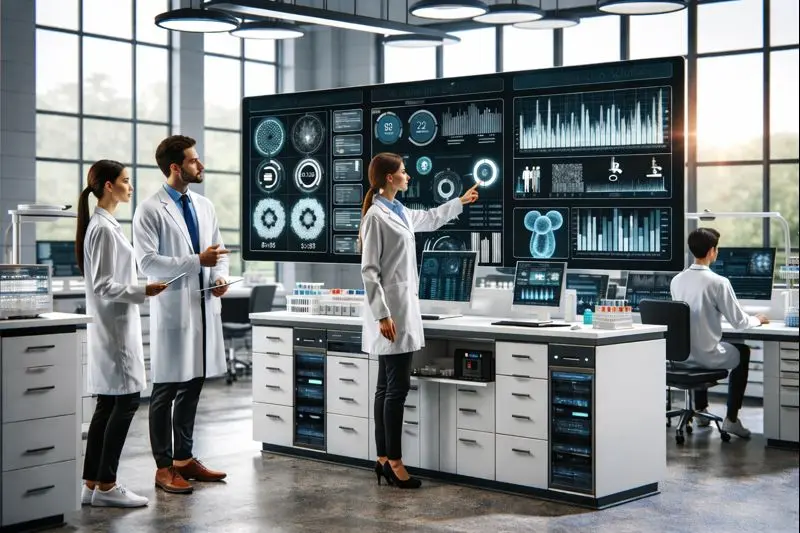Blog
Transforming Patient Care: The Power of Laboratory Information Systems (LIS) in Healthcare
September 3, 2025
Laboratory information systems (LIS systems) are essential in today's healthcare industry, as they streamline pathology lab management for vast volumes of patient and specimen data.
This data is critical in developing clinical insights, enhancing patient outcomes, and improving overall healthcare efficiency for anatomic pathology practices and clinical laboratories.
Key Laboratory Information System Functions for Healthcare Providers
Modern LIS laboratory information system software offers advantages over legacy LIS systems, ultimately leading to better patient care and improved medical outcomes.
Key benefits include:
- Automating Laboratory Workflow Management: Modern LIS systems reduce manual labor with rules and automation, increasing efficiency and minimizing the risk of errors.
- Integrating Data from Other Laboratory Software Systems: The best laboratory information system software promotes seamless and silo-free data sharing and communication among various healthcare systems.
- Managing Laboratory Equipment and Supplies: Advanced medical LIS systems aid in resource utilization and inventory control.
- Generating Data-Driven Reports: The latest LIS system software allows healthcare providers to make informed decisions based on accurate and up-to-date patient and specimen data.
- Facilitating Access to Reports for Physicians: Advanced LIS systems enable faster decision-making and treatment planning.
- Simplifying Access to Patient Data: The best LIS systems streamline data imports and retrieval via interfaces with instruments, EHRs (electronic health records), and third-party services (such as lab billing services), promoting an efficient flow of information and better patient outcomes.
- Ensuring Reliable Specimen Tracking and Lab Test Results: Advanced LIS systems reduce sample tracking and reporting errors, providing timely and accurate diagnoses.
- Improving Laboratory Billing Process Efficiency: Modern laboratory information systems simplify lab billing workflows and the overall laboratory billing process by reducing administrative workload.
- Enhancing Communication Between Hospitals and Laboratories: The best laboratory information system software fosters collaboration plus fast and accurate test results, resulting in better patient care.
Discover More: The Best Laboratory Information System Companies and the Advantages They Offer to Their Laboratory Clients

How Advanced Laboratory Information Systems Transform Medical Settings
The best laboratory information systems have transformed the way patient and specimen data are collected, organized, and used across healthcare. These LIS systems connect information from MRI and CT imaging, laboratory analyzers, and other instruments. By integrating data from multiple sources, advanced medical LIS software helps hospitals, clinics, and urgent care centers work more efficiently and productively.
Modern laboratory information systems have become vital for pathology labs. They oversee the full testing process and ensure compliance with regulatory standards. By streamlining workflows, enhancing accuracy, and strengthening collaboration, these advanced medical laboratory solutions enable providers to deliver higher-quality care and improve patient outcomes.
Discover More: How do I Know if My Laboratory has Outgrown its LIS System?
The Indispensable Role of Laboratory Information Systems in Independent Laboratories
Independent anatomic pathology practices and clinical and molecular laboratories handling a significant volume of tests greatly benefit from robust laboratory workflow management software developed by the best laboratory information system vendors. The best LIS software streamlines and simplifies lab workflow by creating a single source of truth for all lab data, enabling these independent medical laboratories to deliver accurate and timely results that satisfy and retain customers (and improve patient care).
The Three Key Phases of LIS Laboratory Information System Workflow
Now that we’ve established that advanced laboratory information systems and the best LIS software vendors play a vital role in anatomic pathology practices and clinical and molecular laboratories, let’s dive further into how ensuring the smooth flow of LIS medical platforms effectively supports the following analytical phases.
Pre-Analytical Phase: Modern laboratory information systems streamline test ordering, specimen collection, and sample tracking, all while reducing the risk of errors and ensuring samples are prepared correctly for analysis.
Analytical Phase: Advanced laboratory information system software routes specimens to the appropriate analyzers, facilitating efficient data processing and accurate result generation. By automating this process, laboratories can handle higher test volumes with greater precision and improved turnaround times.
Post-Analytical Phase: The most effective laboratory information systems support transmission of results, report generation, critical value alerts, and thorough documentation. This grants healthcare providers access to accurate, complete data that drives better decisions and elevates patient care.
Discover More: A Detailed Look at How Modern Laboratory Information Systems Fully Support Quality Control

Embracing the Latest Laboratory Information System Software Technology
By adopting the best LIS software technology, independent medical laboratories can benefit from several advanced laboratory information system functions.
- Enhanced Efficiency: Advanced laboratory information systems automate many manual processes, enabling laboratories to manage a higher volume of tests (without compromising accuracy or speed).
- Improved Accuracy: By reducing the risk of human error in specimen handling, sample tracking, and data processing, modern LIS systems ensure more accurate test results, leading to better patient care and outcomes.
- Streamlined Communication: The latest lab information system solutions facilitate seamless communication between independent laboratories and other healthcare facilities, promoting a valuable collaborative approach to patient care.
- Easier Compliance with Regulations: The best LIS software technology helps medical laboratories maintain compliance with industry standards and regulatory requirements by providing a comprehensive audit trail and automating essential pathology lab management processes.
- Increased Competitiveness: By embracing advanced LIS lab technology, independent testing organizations can offer faster, more accurate services and support client preferences for lab report design and distribution, giving them a desired competitive edge in the marketplace.
Discover More: How LigoLab's Pathology Lab Software Supports Lab Report Customization and Client Preferences
LigoLab's Comprehensive LIS System Solution and the Value it Brings to Independent Labs
LigoLab's comprehensive LIS system with advanced embedded laboratory billing functionality, the LigoLab Medical LIS & Lab RCM Informatics Platform, is tailored to support growing independent anatomic pathology practices and clinical and molecular labs by optimizing workflow efficiency, minimizing operational costs, and elevating the healthcare facility’s professional and business standards.
Comprehensive Training and Support for Medical Personnel
LigoLab is a LIS company committed to empowering lab technicians, lab managers, and other medical professionals with the knowledge and skills they must have to use its lab pathology software.
Through extensive training and support, healthcare professionals can maximize the benefits of LigoLab’s all-in-one diagnostic lab software to enhance job satisfaction and optimize patient outcomes.
Discover More: What Lab Leaders Should Do Immediately After Receiving Notice Their LIS System is Sunsetting

The Advantages of Adopting a Flexible and Integrated Medical Laboratory Information System
Transitioning to a comprehensive, highly configurable, and fully integrated medical laboratory information system with embedded laboratory billing functionality offers numerous benefits for modern medical labs. With LigoLab's advanced LIS system technology, these labs can:
- Streamline Operations: LigoLab's all-in-one LIS model simplifies laboratory workflow and lab revenue cycle management (lab RCM) processes, enabling healthcare providers to work more efficiently.
- Enhance Patient Care: By reducing the risk of human error and ensuring accurate test results, LigoLab's enterprise-grade LIS software solution helps healthcare professionals make informed decisions for better patient care.
- Boost Collaboration: LigoLab's integrated LIS lab platform fosters seamless communication between various healthcare facilities, promoting a collaborative approach to patient care.
- Improve Compliance: LigoLab's platform also helps laboratories maintain compliance with industry standards and regulatory requirements by providing a comprehensive audit trail and automating essential LIS system and lab revenue cycle management processes.
- Save Time and Resources: By automating routine tasks and simplifying clinical workflows, LigoLab’s advanced laboratory information system enables independent labs to save time and resources, control costs, scale efficiently, and deliver better patient care.
By adopting LigoLab's cutting-edge LIS software technology, medical labs can modernize their processes, consistently deliver exceptional patient care, and maintain a competitive edge in what continues to be a dynamic and challenging healthcare environment.
Ready to make the move and learn more?
To learn more about LigoLab, its end-to-end pathology lab software, customer-focused service, and tiered pricing model that delivers value for labs of all sizes and specialties, explore the links below before scheduling an introductory call with a LigoLab information system specialist.
Discover More: Can Your Laboratory Information System Support the Latest LIS System Technology?
Discover More: How to Turn Your Mid-Sized Medical Laboratory into a Thriving Large-Scale Operation
Discover More: How to Prepare for Tomorrow’s Tech-Enabled Clinical Lab



.webp)


